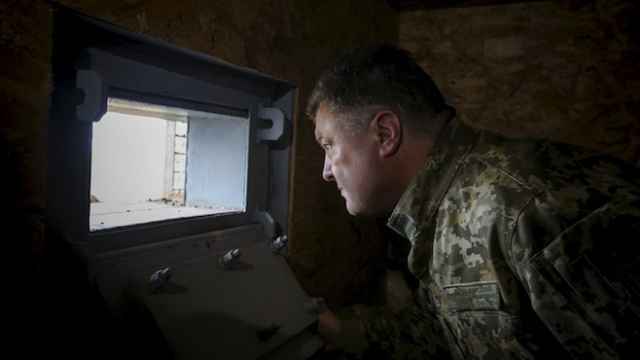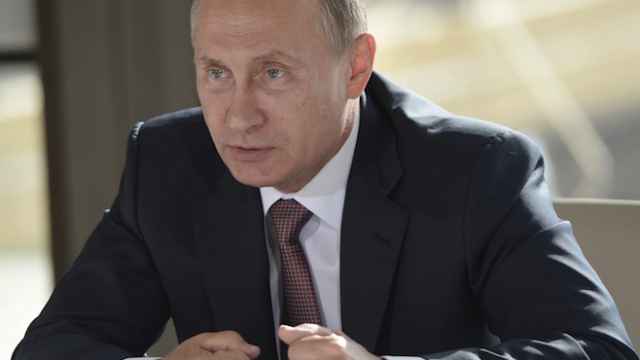A spasm of street violence has driven home how hard it is going to be for Ukrainian President Petro Poroshenko to rally national support behind an internationally brokered deal to bring peace to the east of his country.
The violence outside parliament on Monday was triggered by the government's "decentralization" plans — a key part of the deal agreed in Minsk, Belarus in February — that would give special status and greater autonomy to separatist-held areas of the east.
Three guardsmen died of wounds from grenade shrapnel and scores were injured in the clashes which the government blamed on ultranationalist radicals.
The main nationalist party, Svoboda, has denied government charges that its activists were responsible for the grenade attack and has blamed police for being unprepared.
Poroshenko himself said the deadly attack was probably the work of a freelance "provocateur" out to stir up trouble.
That violent elements could lay hands on weapons is no surprise. After 18 months of military conflict in the east in which several thousands of people have been killed, Ukraine is awash with guns, ammunition and explosives.
But the violence, the worst in Kiev since the bloody turmoil of the Euromaidan protests in early 2014, has thrown focus on where Ukraine goes from here in trying to re-establish its sovereignty in the east.
The outburst of street anger also took the edge off celebrations over a big financial deal, hailed by Kiev as a "win-win," for restructuring billions of dollars of Ukrainian foreign debt.
Narrowing Options
In reality, the prospects for Poroshenko to sell the deal have been narrowing for some time, analysts say.
Cracks have opened up in the pro-Western coalition and more street demonstrations are now a distinct possibility. Poroshenko may now choose to slow down on granting concessions to the separatists which his critics say threaten to weaken Ukrainian sovereignty.
Popular resentment over the Minsk II agreement, negotiated by the leaders of Ukraine, Russia, Germany and France, has been growing for some time.
Many fear the government's plans will only entrench the independent status of the rebel-held Donetsk and Luhansk regions with Russia maintaining its military influence in the region and control of the border.
"The accords [Minsk agreements] are full of ambiguities, baited hooks and traps. They give each side multiple pretexts for claiming violation by the other. They do not provide a firm basis for a settlement," said James Sherr, Associate Fellow of London-based Chatham House.
"He [Poroshenko] knows that if he accepts Russia's terms, the country will not. People have sacrificed too much. They will see it as a betrayal. Poroshenko will put his legitimacy at risk if he bows to all this pressure, and he knows it," said Sherr.
The demonstration was led by Svoboda, a party which has been subdued since losing representation in parliament, and members of the anti-Russian Radical party, a feisty member of the coalition until Tuesday when its leader, Oleh Lyashko, walked out in protest at the vote.
The clashes turned ugly after Poroshenko's government managed to secure the required vote for an initial reading of constitutional amendments that will give increased powers of autonomy to the Donetsk and Luhansk regions.
In speeches before the vote, many politicians, including some of Poroshenko's coalition allies such as former Prime Minister Yulia Tymoshenko, came out against what they saw as a threat to territorial integrity.
End-of-Year Targets
Apart from the special status law, several other hurdles have to be crossed under the increasingly troubled Minsk II package.
Oct. 25 has been set for local elections in Ukraine though the Kiev government says these will not take place in parts of the east controlled by the separatists and where security cannot be guaranteed. Kiev wants the elections to reinforce Ukraine's identity as a "unitary" state.
The separatists, who have unilaterally set up their own mini-republics, have instead scheduled their own elections for October and November — the results of which Kiev is unlikely to recognize.
That begs the question: Even assuming the constitutional reform goes through, when will Kiev grant the "special status" to the rebel-held regions? Only when there are elected officials in the rebel-held areas whom they trust? That might be never.
More than 6,500 people — civilians, Ukrainian forces, separatists and almost certainly Russian troops — have been killed so far in the conflict which erupted in April 2014 after the annexation by Russia of Crimea in response to the fall of a Moscow-backed president in street protests in Kiev.
Analysts believe Poroshenko has set himself a priority of keeping casualties on eastern front lines to an acceptable minimum and avoiding any military disasters such as that at Illovaisk in August 2014 when hundreds of Ukrainian troops were encircled and killed.
Other ambitious end-of-year targets under the Minsk II agreement now seem increasingly fanciful to many politicians.
These include a withdrawal of Russian forces and recovery by Ukraine of control over the joint border.
"Without something on a withdrawal of Russian forces and control of the border the whole idea of the Minsk agreement simply evaporates," said Taras Berezovets of Berta Communications.
But both of these points are diplomatically easy to "finesse" for Russia's Vladimir Putin, who denies his troops have been deployed in Ukraine at all, analysts say.
'Cardiogram for Death'
Crucially the Minsk deal encompasses no real plan for Kiev's recovery of lost territories.
For Poroshenko's critics, including some of his erstwhile political allies, it is increasingly looking like a step-by-step roadmap to a "frozen conflict" in which Ukraine loses any chance of re-asserting control in the east.
Poroshenko's critics say the proposed reform will give the separatists the right to choose their own courts and militia, create a special relationship with Russia and provide an amnesty for rebels who already have the blood of Ukrainian soldiers on their hands. And all that without anything gained.
Returning to the political foreground after being sidelined by the Euromaidan revolution that brought Poroshenko to power, Tymoshenko criticized his policies for giving the "illusion of peace."
A "cardiogram for death" is how a critic from Self-Help, another pro-Western party, described the proposed constitutional reform enshrining greater self-governance for rebel-held areas.
In fact, Poroshenko has little elbow room to press a more active policy against Putin, whose strategic aim seems to be to promote continued instability to keep Ukraine off-balance, frustrating Kiev's aspiration of integration into the European mainstream.
"Even though the Minsk agreement is not being fulfilled, they [the government] have no alternative to it. The only alternative is a resumption of military action," Berezovets said.
In Luhansk, a Ukrainian city close to the Russian border that is firmly in the hands of separatists, shops are now selling their goods in Russian rubles rather than Ukrainian hryvnas, according to local people there.
It is becoming increasingly difficult to see how the Kiev authorities can roll this back and re-establish control through diplomatic efforts alone, without a switch in policy by Putin.
With Russia's military crossing the border with impunity and able to dictate the pace of events on the ground in the east, Putin is telling Poroshenko to sit down at the negotiating table and talk with the separatist leaders — anathema to Kiev since it would imply recognition of their self-proclaimed independence.
Poroshenko, who is under pressure from Washington and Berlin to push through the special status amendment, seems to be pinning his hopes for a change of heart — and tactic — by Putin, forced by firm Western resolve backed up by sanctions on Moscow.
The worst that could happen, according to Poroshenko's thinking, is that the West takes its foot off the pedal and eases, or ends, sanctions.
"If we did not vote for reform … the question of these sanctions, which really hurt the aggressor, continuing would disappear from the agenda. We'd be left one-on-one with the aggressor," he said.
He may now try to strike political deals to blunt the rebellion within the pro-Western coalition before a second and final reading of the "special status" amendment.
But even if he succeeds this may not be enough to put the lid on further street unrest.
A Message from The Moscow Times:
Dear readers,
We are facing unprecedented challenges. Russia's Prosecutor General's Office has designated The Moscow Times as an "undesirable" organization, criminalizing our work and putting our staff at risk of prosecution. This follows our earlier unjust labeling as a "foreign agent."
These actions are direct attempts to silence independent journalism in Russia. The authorities claim our work "discredits the decisions of the Russian leadership." We see things differently: we strive to provide accurate, unbiased reporting on Russia.
We, the journalists of The Moscow Times, refuse to be silenced. But to continue our work, we need your help.
Your support, no matter how small, makes a world of difference. If you can, please support us monthly starting from just $2. It's quick to set up, and every contribution makes a significant impact.
By supporting The Moscow Times, you're defending open, independent journalism in the face of repression. Thank you for standing with us.
Remind me later.





